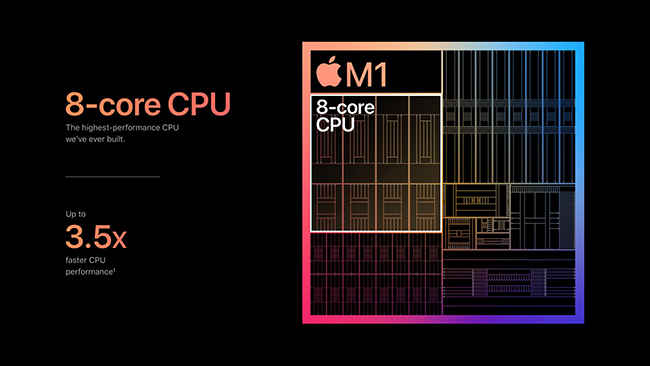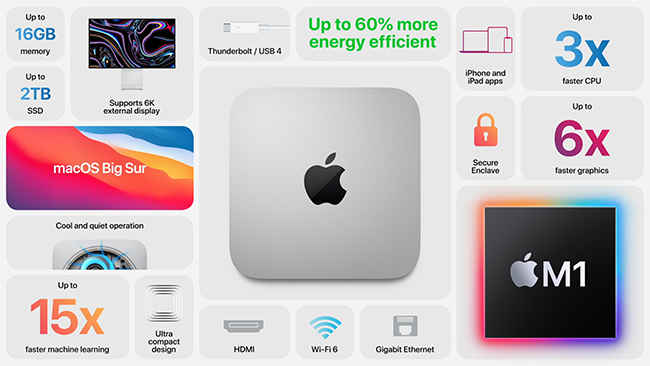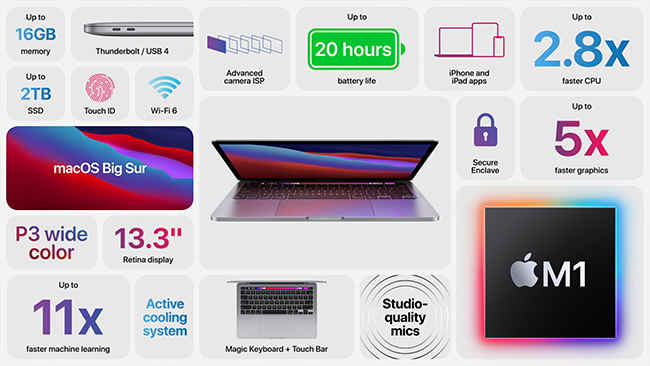Apple announces octa-core M1 SoC, will power new Macbook Air, MacBook Pro and Mac Mini | Trendsmedia.
Apple today finally unveiled the System on Chip that will be powering its next generation of laptops and desktop computers, dubbed M1. Apple had revealed its plans for the move earlier this year. Alongside the M1, Apple also announced three new pieces of hardware; the new MacBook Air, the new Mac Mini and a brand new MacBook Pro 13-inch, all powered by the new M1 SoC. This marks the beginning of a two-year transition period for Apple from Intel-based Macs to those powered by their own Silicon. There’s a lot to unpack here, so let’s dive right in.
Apple M1: Everything you need to know about Apple SiliconThe Apple M1 is a System on Chip built using ARM’s instruction set, as against the current x86 architecture that has been dominant in the PC space for decades. Using ARM’s instruction set, we see some similarity in the way Apple has gone about the M1 in comparison to its A-series processors. The first and foremost notable thing is Apple turning to the big.LITTLE design, with 4 high-performance cores and 4 high-efficiency cores on the M1. Current x86-based processors do not employ such a design, causing them to be less battery efficient. In addition, the M1 also features a GPU baked in with up to 8-Cores. The M1 chip also packs a 16-core Neural Engine. Perhaps the most incredible feat wit the M1 chip is the fact that it integrates the CPU-GPU Cores, the DDR4 memory, I/O chip, the Thunderbolt Controller and the Apple T2 Secure Enclave all into one chip. In addition, the new M1 chip also brings a host of industry-leading technologies to the platform, enabling workloads that weren’t previously possible on devices in the class. Besides high-performance, Apple is also promising some incredibly battery life thanks to the M1 chip.

The MacBook Air has been the most popular thin and light laptop for many years, for its exceptionally light form-factor through which Apple was able to deliver reliable performance and exceptional battery life. The 13-inch laptop from Apple powered by the M1 chip gets claimed CPU performance bump of up to 3x in comparison to the previous model while the GPU performance is bumped up to 5x, thanks to the GPU which can be configured with up to 8-Cores. The storage on the new MacBook Air is now twice as fast as the one featured on the Intel-based model, allowing for larger files to open faster. Another notable achievement made possible by the M1 chip is the shift to a fan-less design.
Mac Mini: Everything you need to knowThe Mac Mini has been a very versatile machine from Apple’s stables. Besides being a mini-PC that can fit into even the smallest crevices of a work-desk, the last update to the Mac Mini also made it a favourite as rendering machines. Apple is infusing the M1 chip on to the Mac Mini as well, giving it the power of 8 CPU cores and up to 8 GPU Cores. Given the configuration, Apple claims that the new Mac Mini can deliver up to 4x the frame rate in titles like Shadow of the Tomb Raider, which is a pretty bold claim. When we tested the game on the 16-inch MacBook Pro at 1080p, we noted frame rates of just about 45fps. Apple also claims that users can render complex timelines in FinalCut Pro up to 6 times faster on the new Mac Mini powered by the M1 chip than an Intel-comparable configuration.

Finally, we have the 13-inch MacBook Pro which gets the new M1 chip. The MacBook Pro has been a staple favourite amongst content creators for the longest time, however, with the he 13-inch Intel-based model lacking a powerful GPU, its use cases were limited. Now with the M1 chip, users will finally be able to get a lot more out of the MacBook Pro, if Apple’s claims about the 8-core GPU are to be believed, the MacBook Pro 13-inch could end up being a viable alternative to the larger 16-inch Intel-based model for creative professionals.

Apple has had the foresight to prepare the app-ecosystem for the transition to Apple Silicon. Apple has announced Universal Apps, programs that are built on a code-base which allows the same application to run on both Apple Silicon and Intel-based Macs rather seamlessly. For applications that are currently limited to Intel-based machines, Apple has Rosetta 2, an application compatibility layer that will allow you to run all your programs on the Mac. Additionally, Apple has said that all iOS and iPadOS will run natively on the M1-powered machines as well. What remains to be seen is how the plugins for various editing applications will be handled. Will an x86 version of the plugin work seamlessly with an Intel-based Mac App? Also, will Apple allow access to the iOS and iPadOS App Store from directly within Big Sur?
MacBook Air, Mac Mini and MacBook Pro 13-inch Price and AvailabilityThe MacBook Air will retail at a starting price of Rs 92,900, while the MacBook Pro 13-inch will start at Rs 1,22,900. The Mac Mini can be picked up for a starting price tag of Rs 64,900. Apple is also offering student pricing on these machines which is notably lower than the MRP, and also offering bundle apps like FCP, Compressor, Logic etc. Additionally, it should be noted that the prices mentioned are for base configurations, which feature the M1 chip, 8GB DDR4 memory and 256GB of storage. All machines. Can be configured with up to 16GB DDR4 memory and a whopping 2TB of storage. As for shipping dates, the Apple India Store currently pegs the shipping date for the three machines to be between November 25 and December 1.
Credit to Digit.in





No comments